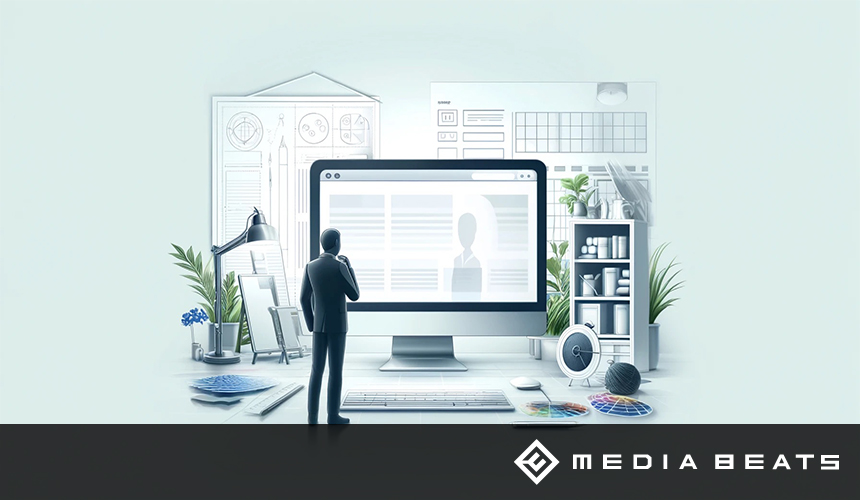
Creating a website in 2024
In 2024, businesses have a wide range of options for creating professional websites. From traditional web design agencies and DIY website builders to modern AI-driven platforms, the choices are diverse. In this article, we explore the different approaches, their advantages and disadvantages, and help you find the right method to suit your needs.
Classic web design by agencies
The traditional way to have a website created often involves working with a web design agency. These agencies offer customized solutions tailored to the specific requirements of the client. With a team of designers, developers, and content specialists, agencies work to create a website that is both functional and aesthetically pleasing.
Advantages:
Through close collaboration with an agency, tailor-made solutions are created, offering the highest level of flexibility and adaptability. Additionally, the professional quality ensures high-end designs and extensive functionalities. Agencies also provide comprehensive services—from the initial concept and design to SEO optimization and ongoing maintenance.
Disadvantages:
These custom solutions often come with high costs and a longer development timeline. The entire process can take several weeks or even months to complete.
DIY website construction kits
For those seeking a quick and cost-effective solution, DIY website builders like Wix, Squarespace, or Weebly are an attractive option. These platforms allow users to create a website without any coding knowledge. With pre-designed templates and a user-friendly drag-and-drop interface, users can build a functional website in no time.
Advantages:
The ease of use and quick setup make these website builders very popular. Websites can be completed in just a few hours, and the costs are significantly lower compared to hiring an agency.
Disadvantages:
However, the limited customization options and dependence on the platform provider can be a drawback. Additionally, these solutions are less suitable for complex or rapidly growing websites.
Content-Management-Systems (CMS)
Content management systems like WordPress, Joomla, or Drupal offer a flexible platform for creating and managing websites. While they require more technical knowledge than website builders, they provide significantly greater customization and expansion options.
Advantages:
Ein CMSEin Content Management System, kurz CMS, ist eine Softwarelösung, die es ermöglicht, digitale Inhalte wie Texte, Bilde... bietet hohe Flexibilität dank einer breiten Palette an Plugins und Themes. Die große Community hinter diesen Systemen sorgt für umfangreiche Unterstützung und Ressourcen. Zudem sind CMS-Plattformen sehr skalierbar und eignen sich sowohl für einfache Blogs als auch für komplexe Unternehmensseiten.
Disadvantages:
Die Nutzung eines CMSEin Content Management System, kurz CMS, ist eine Softwarelösung, die es ermöglicht, digitale Inhalte wie Texte, Bilde... erfordert technisches Know-how. Installation und Wartung können komplex und zeitaufwendig sein. Außerdem müssen regelmäßige Updates und Sicherheitsmaßnahmen eingehalten werden, was zusätzliche Kosten und Aufwand bedeutet.
AI-driven website builder
One of the latest developments in web design are AI-driven website builders such as Bookmark or Zyro. These platforms use artificial intelligence to automate the creation process. The AIArtificial intelligence (AI) is an interdisciplinary field of research that deals with the development of computer tech... analyzes the user's needs and automatically generates a suitable website.
Advantages:
This method is extremely efficient and user-friendly. The automated creation saves time and effort, while the AI delivers personalized recommendations based on user input.
Disadvantages:
Control over the website is limited, as there are fewer manual customization options. The quality of the results can vary depending on the AI algorithms used. Additionally, this is a relatively new technology that may still have some teething issues.
Freelancers and individual entrepreneurs
Freelancers offer a flexible and often more cost-effective alternative to large agencies. These sole traders work independently and can implement specific customer requirements.
Advantages:
Freelancers are usually cheaper than large agencies and offer individual customization and personal support. Direct communication enables quick coordination and adjustments.
Disadvantages:
There is a certain risk involved, as the reliability of the freelancer is crucial. In addition, freelancers may have fewer resources and skills than a large agency. Long-term support after project completion may also be limited.
Conclusion
The choice of method for creating a website depends on your individual needs, budget, and technical skills. While traditional agencies and freelancers offer custom, high-quality solutions, DIY builders and CMS platforms allow for a quick and cost-effective implementation.
AI-driven tools represent an innovative option that is becoming increasingly important. It is important to carefully weigh up the pros and cons of each method and choose the one that best suits your requirements.
